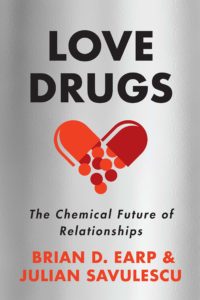Announcement: Brian Earp and Julian Savulescu’s new book ‘Love Drugs: The Chemical Future of Relationships‘, published by (Stanford University Press) is now available.
 Is there a pill for love? What about an “anti-love drug”, to help us get over an ex? This book argues that certain psychoactive substances, including MDMA—the active ingredient in Ecstasy—may help ordinary couples work through relationship difficulties and strengthen their connection. Others may help sever an emotional connection during a breakup. These substances already exist, and they have transformative implications for how we think about love. This book builds a case for conducting research into “love drugs” and “anti-love drugs” and explores their ethical implications for individuals and society. Scandalously, Western medicine tends to ignore the interpersonal effects of drug-based interventions. Why are we still in the dark about the effects of these drugs on romantic partnerships? And how can we overhaul scientific research norms to take relationships more fully into account?
Is there a pill for love? What about an “anti-love drug”, to help us get over an ex? This book argues that certain psychoactive substances, including MDMA—the active ingredient in Ecstasy—may help ordinary couples work through relationship difficulties and strengthen their connection. Others may help sever an emotional connection during a breakup. These substances already exist, and they have transformative implications for how we think about love. This book builds a case for conducting research into “love drugs” and “anti-love drugs” and explores their ethical implications for individuals and society. Scandalously, Western medicine tends to ignore the interpersonal effects of drug-based interventions. Why are we still in the dark about the effects of these drugs on romantic partnerships? And how can we overhaul scientific research norms to take relationships more fully into account?
Ethicists Brian D. Earp and Julian Savulescu say that the time to think through such questions is now. Biochemical interventions into love and relationships are not some far-off speculation. Our most intimate connections are already being influenced by drugs we ingest for other purposes. Controlled studies are underway to see whether artificial brain chemicals can enhance couples therapy. And conservative religious groups are experimenting with certain medications to quash romantic desires—and even the urge to masturbate—among children and vulnerable sexual minorities. Simply put, the horse has bolted. Where it runs is up to us. Love Drugs arms us with the latest scientific knowledge and a set of ethical tools that we can use to decide if these sorts of medications should be a part of our society. Or whether a chemical romance will be right for us.
Reviews
“This book offers a fascinating, game-changing scientific argument for the use of unconventional medicines by those struggling with matters of the heart. We all suffer; some even kill or die for love. If ‘love drugs’ can alleviate the pain of rejection, curb domestic abuse, and even enhance feelings of attachment in struggling partnerships, many of the important ideas here could enrich—even save—lives around the world.” — Helen Fisher, author of Anatomy of Love
“Love Drugs reports current science on the effect of drugs on love and sex, adds anecdotes and case studies, and combines that with ethics and wisdom on what is important. The result is a fascinating account of a future that is starting to unfold right now.” — Peter Singer, author of Ethics in the Real World
“The psychopharmacology of love has been with us since the ancient Greeks celebrated the wine-soaked festivals of Dionysus. But not until this intoxicating, astonishing, dangerous book have we had the deep chemistry of our eroticism revealed. If you want to learn to be a better lover—and who doesn’t?!—Earp and Savulescu show you how the drugs we have developed are expanding our capacities for connecting with each other.” — Clancy Martin, author of Love and Lies

I hope the book becomes reality.
Comments are closed.